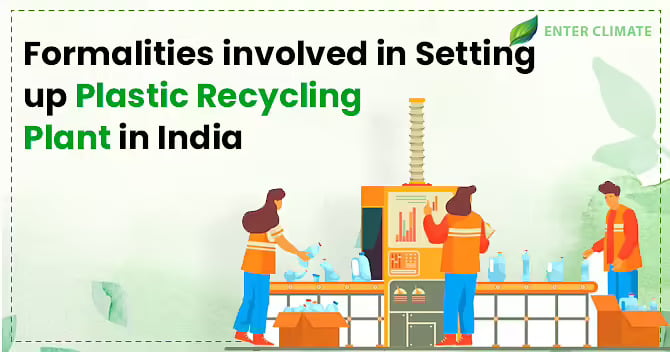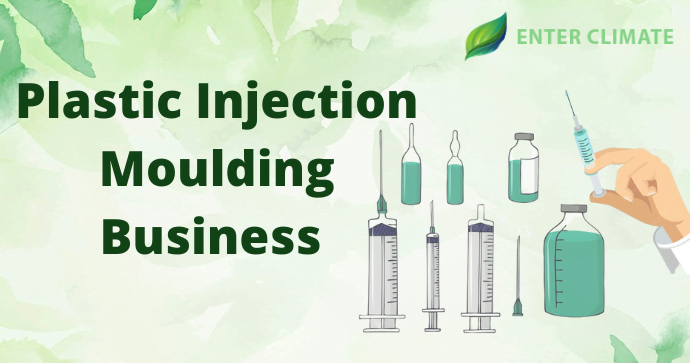Formalities involved in Setting up Plastic Recycling Plant in India
 06 Aug, 2022
06 Aug, 2022 
Plastic is defined as a group of materials, either naturally or synthetically made, that can be molded into any shape. Plastic is also a type of polymer that is made of many repeating units. In India, Plastic is defined as “a material that contains an important component including a high polymer ” under Plastic Waste (Management) Rules, 2016. With qualities and characteristics including lightweight and low cost, plastic has become the most popular material which is now used in the manufacturing of any product as raw material, including many electrical and electronic equipment and household materials.
Ministry of Petroleum and Natural gas estimated that per capita plastic consumption in India would be approximately 20 kg by 2022. With this much consumption of material which is not only had to manage but impossible to disintegrate cause the quantity of waste in India skyrocketed. Due to this, government authorities have taken many steps and have adopted many policies to encourage environmentally sound management of plastic, including setting up a plastic recycling plant in India.
Plastic Waste generation in India
Plastic waste is defined as “any plastic disposed of after use or after their intended use is over.” India ranks 94th in per capita plastic waste generation, being the second-most populous country in the world, closely succeeded by the United States of America and China, the most prominent plastic waste generating countries. In the most recent annual report of the Central Pollution Control Board, the total plastic waste generation in India, as per the data provided by 35 States and Union Territories for the year 2019-20, is approximately 34,00,000 tonnes per annum with Maharashtra generating the maximum amount of Plastic Waste followed Tamil Nadu and Punjab. In roughly 70 years, 8.3 billion metric tons of plastic have been produced, with around 6.3 billion metric tons of that becoming waste.
With much plastic waste generation in India government implemented Plastic Waste (Management) Rules, in 2016 with the primary objective of adequately managing and handling plastic waste generation in India. Under provision 17(4) of Plastic Waste Management Rules, 2016[1], the rules have mandated that the Central Pollution Control Board consolidate annual reports on the management and use of plastic waste, submitting them to the Central Government.
Plastic Recycling
The plastic Recycling process can be described as the procedure of recovering waste or scrap plastics and reprocessing the material into something helpful material, which can be either in a completely different form or can be in its original state. The Plastic Waste recycling process includes: –
- Collection and distribution
Before even starting the process, the recycler has to set up collection centers or have to collect plastic from various sources, including homes, businesses, and other institutions. The recycler can do this collection either on their own or by delegating the responsibility to the Producers’ responsibility organization. Recycler can also take assistance from local government authorities for the same.
- Sorting or categorizing
After the Collection of Plastic Waste, the actual recycling process starts with sorting or categorizing the different types of plastic waste into different categories. These plastic are sorted by color, thickness, and use. This process can either be done physically by a worker or by machines in recycling plants.
- Washing
The process of sorting or categorizing is followed by another crucial step which is washing which removes impurities such as product labels and adhesives, for example, dirt and food residue.
- Shredding
After being passed into shredders, the plastic is reduced to smaller pieces. Unlike formed plastic items, these tiny bits can be reused after further processing. The downsized plastic pieces can also be sold as raw materials or used in other ways without further processing, like as an additive in asphalt. Finding any lingering contaminants is also made possible by shredding the plastic into tiny pieces. This is particularly true for impurities like metal, which may not have been eliminated by washing but which can now be easily collected with a magnet.
- Extruding and Compounding
The scraps of shredded plastic are converted into a form that manufacturers can use in this last step of the recycling process. To create pellets, the shredded plastic is melted and combined. The fact that different grades of plastic are occasionally shipped to other recycling facilities for this last stage should be noted as it is not always feasible to compound all types, classifications, and quality of plastic at a single plant.
Eligibility for setting up Plastic Waste Recycling Plants
Before setting up plastic waste recycling plants, the recycler must meet specific criteria mandated by the state pollution control board. Some of these criteria are:-
First of all, the recyclers have to make sure that they have sufficient land and space for proper manufacturing or recycling process. The space should be ample enough for setting up a recycling plant. The size of the unit should depend on the scale of the plant set-up. A small unit requires small space, and a large unit requires more extensive space. Apart from this, the unit also requires proper machines and a workforce with relevant experience for proper functioning.
Registration of Plastic Waste Recycling plants
Plastic Waste Recycling plant because it is important for proper management/handling of plastic waste that requires many licenses and documents for setting up for the Central Pollution Control Board to keep in track of the plastic handled and its sustainable disposal.
Firstly, the Recyclers need to get registered with the State pollution control Board or Pollution Control Committee of that particular state or union territory, respectively prescribed under Rule 13 of the Plastic Waste (Management) Rules for which they have to carry out the following steps:-
- First, recyclers have to create their unique Industry Registration ID with the State pollution control Board through their online portal.
- After the Registration ID is created, the industry or manufacturing plant will apply for authorisation as per the given industrial categories along with the required document.
- Following this, the recyclers should select Form II after logging in.
License/ Documents required to set up the business
- Electricity Bill
- Authorized signatory Aadhar Card
- Layout Plan
- FSSAI Certificate
- NOC by state pollution control board
- GST registration
- Authorized signatory PAN Card
- MSME Registration
Conclusion
Plastic Recycling Plant has proven to be a very lucrative business In India, with an approximate value of 41.73 billion dollars, and the expected growth at a CAGR of 6.6%. The newly set up plastic business is projected to revenue a profit of 20% to 60% proving that it is not only beneficial for the environment but also is very valuable the for development and growth of the Country’s economy.












